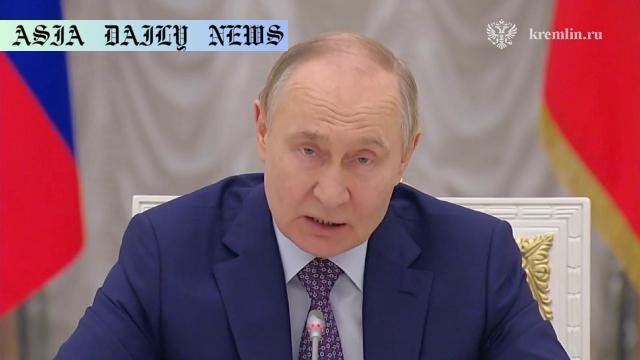Rebuilding: Putin highlights progress in four annexed Ukrainian regions, sparking international law concerns.
Putin highlights rebuilding efforts in four annexed Ukrainian regions.
Kyiv claims the annexation violates international law.
Russia claims to have repaired 23,000 buildings and 5,400 kilometers of roads.
Ukraine rejects Russia’s peace treaty demands as unfeasible.

Russia’s Rebuilding Efforts in Annexed Ukrainian Regions
Russian President Vladimir Putin recently emphasized the ongoing rebuilding and development initiatives in four Ukrainian regions that Russia controversially claims to have annexed. These territories, including Donetsk and Luhansk in the east, and Zaporizhzhia and Kherson in the south, are at the heart of an international dispute. While Moscow showcases its efforts as a sign of progress and commitment to the residents of these areas, international law experts and Ukraine’s officials deem the annexation illegitimate.
During a meeting focused on the socioeconomic development of these regions, Putin provided specific data to support his claims. According to the Russian president, approximately 5,400 kilometers of roads have been repaired or constructed, while 23,000 buildings, including vital infrastructure such as schools and hospitals, have been rebuilt or renovated. Notably, these claims are contrasted with continued military aggression in Ukraine. Criticism remains high from the international community, which questions the motivations and fairness of these rebuilding efforts in regions seized through contested means.
Ukraine’s Stance and Ongoing Conflict
While Russia pushes for recognition of the annexed territories and pressures Ukraine to withdraw its military forces, Kyiv maintains a firm stance. Ukraine outright rejects any proposals that suggest legitimizing the annexation of its sovereign land. President Volodymyr Zelensky’s administration considers such proposals as rehashed demands that disregard Ukraine’s territorial integrity. The international community, including the United Nations, overwhelmingly supports Ukraine’s position, labeling the annexations as illegal.
Despite the claims about socioeconomic development, the Russian military campaign in Ukraine continues unabated. The heavy toll of civilians and infrastructure destruction remains an ongoing tragedy, raising further skepticism about the authenticity of Russia’s rebuilding narrative. Observers believe that the rebuilding claims are part of a broader propaganda campaign to consolidate Russia’s hold over the occupied territories and gain sympathy domestically.
International Implications and Legal Repercussions
The repercussions of Russia’s actions extend beyond Ukraine. By asserting control over these territories and presenting itself as a benefactor through reconstruction, Moscow seeks to establish a semblance of legitimacy. However, legal experts worldwide point out the blatant violations of international laws, including the UN Charter, which strictly upholds the territorial integrity of sovereign nations.
Several countries, including the United States and those across the European Union, have imposed crushing economic sanctions on Russia to penalize its actions. Efforts are also underway to ensure accountability for war crimes and violations committed during the invasion. This situation is a stark reminder of the importance of upholding international standards, even as political conflicts continue to strain global diplomacy.
Conclusion: A Path Forward?
As the war in Ukraine stretches into its second year, the focus remains on finding a peaceful resolution. However, the chances for negotiations appear slim amidst Russia’s push to consolidate control and Ukraine’s determination to defend its territories. The rebuilding claims, whether exaggerated or genuine, do little to mask the dire humanitarian and political crises engulfing the region. Observers caution against accepting narratives that undermine international law and call for sustained support to Ukraine in its fight for sovereignty and independence.
Commentary
The Rebuilding Narrative: Propaganda or Genuine Effort?
Russian President Vladimir Putin’s emphasis on rebuilding efforts in the annexed Ukrainian territories raises significant questions about intent and execution. While it’s undeniable that restoring schools, hospitals, and roads could benefit communities devastated by conflict, the broader controversies surrounding the annexations render these efforts questionable. Are these rebuilding efforts truly aimed at improving the lives of the local population, or are they a form of soft power to cement control?
The Importance of International Law and Sovereignty
The Ukrainian government and much of the international community remain firm that territorial annexations violate international law, undermining the basic principles of national sovereignty. This is a core issue that cannot be overlooked despite any claims of progress. Putin’s narrative fails to address the elephant in the room: the legitimacy of Russia’s actions. By continuing military aggression alongside infrastructure rebuilding claims, Russia presents contradictory signals to the world.
The Human Toll and Broader Implications
Beyond political disagreements, the human cost of this conflict is staggering. Civilians in these occupied regions face uncertain futures, caught between rival narratives and escalating violence. Reconstruction claims do little to reverse the hardships they endure daily. The broader implications of this conflict—economic sanctions, strained relations, and the resurgence of Cold War-like tensions—remind us that wars affect not just leaders and territories but millions of lives.
Final Thoughts
Socioeconomic development in conflict zones is crucial, but it must be pursued transparently and in accordance with international law. Russia’s efforts to rebuild annexed Ukrainian territories might provide temporary relief, but they cannot erase the legal and ethical dilemmas at stake. The global community must engage constructively, advocating for peace, justice, and the sovereignty of nations.


